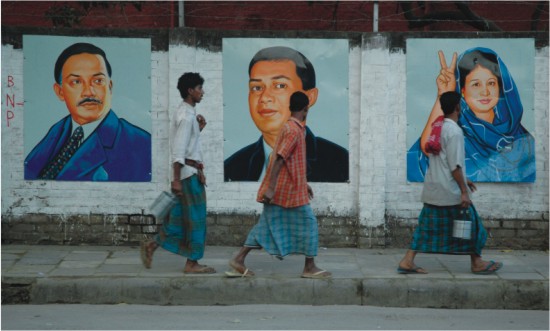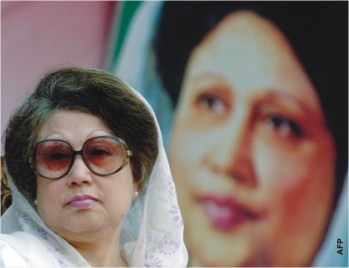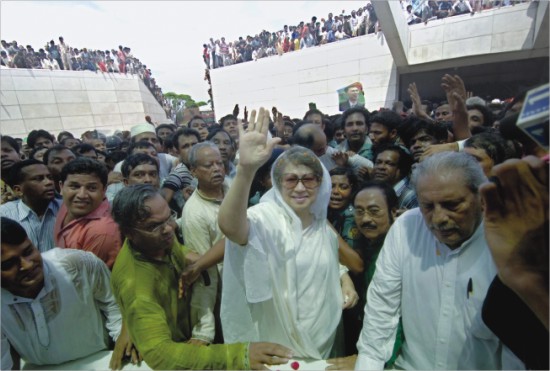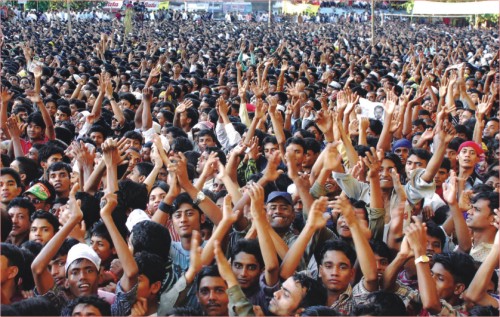
Inside
|
Recrossing the Stream Chowdhury Irad Ahmed Siddiky suggests how the BNP can re-invent itself for the future
Heraclitus once observed that no man crosses the same stream twice, because the stream has changed, and so has the man. In Bangladesh, a transition from civilianised military rule is about to come to an end just as the stream of representative democracy through elections is beginning to gather strength. As it grows into a broadening river, and then become a torrent, the Bangladesh Nationalist Party would cross and recross it, striving to alter its course and, at each stage, being itself subtly altered in its goals and vision. January 11, 2007 -- a day to remember. A day that will last long in infamy. A day when Bangladesh entered the list of failed states. Thus began a long journey of transition through civilianised military rule in a country that was devastated by dynastic authoritarianism, burning in an inferno of electoral engineering. What I refer to as the "transition" is the interval between one political regime, a dynastically elected authoritarian one, and another. Transitions are delimited, on the one side, by the launching of the process of dissolution of an authoritarian regime that was controlling the interim caretaker government in late 2006, and, on the other, by the installation of an alternate form of civilianised military caretaker government as we have at the moment in Bangladesh. It is characteristic of the transition that during such a time the rules of the political game are not defined. Not only are they in constant flux, as we have witnessed in the last two years, but they are usually arduously contested as we have seen since the two former prime ministers were released from their prisons. Military and political actors struggled not just to satisfy their immediate interests and/or the interests of those whom they purport to represent, but also to define rules and procedures whose configuration will determine likely winners and losers in the future. Indeed, those emergent rules will largely define which resources can legitimately be expended in the political arena and which political actors will be permitted to enter it. Moreover, during the transition, to the extent that there are any effective rules and procedures, these tend to be in the hands of our civilianised military rulers. Weakly or strongly, these civilianised military rulers of Bangladesh have retained discretionary power over arrangements and rights which in a stable democracy would be reliably protected by the constitution and various independent institutions. The typical sign that transition has begun is understood when these civilianised military authoritarian incumbents, for whatever reason, began to modify their own rules in the direction of providing more secure guarantees for the rights of individuals and groups. The Bangladesh Nationalist Party is committed to that liberalisation through electoral process, the practice of redefining and extending the fundamental and civil rights of the people of Bangladesh. By liberalisation, I mean the process of making effective certain rights that protect both individuals and social groups from arbitrary or illegal acts committed by the state or by third parties that include foreign powers that practice grassroots imperialism in Bangladesh through manipulation of the foreign aid market or by channeling foreign aid through local NGOs. On the level of the individuals, these guarantees include the classical elements of the liberal tradition -- habeas corpus; sanctity of the private property and contract; the right to be defended in a fair trial according to pre-established laws; freedom of movement, speech and petition; and so forth. On a social level, we expect the government must not only allocate rights to one person or another but it must also decide whether or not to make the right alienable through markets or otherwise. The initial allocation serves to reflect, to legitimate, and to reinforce social understandings about presumptive rights of ownership, and that allocation has an important causal connection to individual perceptions of the good or right in question.
For example, a decision to give employees a right to organise, farmers a right to be free from water pollution, or women a right not to be subjected to sexual harassment will have an impact on social attitudes toward labour organisation, clean water, and sexual harassment. The allocation therefore has an effect on social attitudes toward the relevant rights and on their valuation by both current users and would-be users of those rights. If those liberalised practices are not too immediately and obviously threatening to the regime, they tend to accumulate, become institutionalised and democratised, thereby raising the effective and perceived costs of their eventual annulment. The primary challenge to the process of democratisation of the Bangladeshi polity comes from the Bangladeshi cultural ethos of amoral familism predominant in the dynastic culture of Bangladesh politics. In a society of amoral familists, no one will further the interest of the group or community except when it is to his private advantage to do so. In other words, the hope of material gain in the short run will be the only motive for concern with public affairs. Such a principle is of course consistent with the entire absence of civic improvement endeavors that would lead citizens to take initiative in public service. In a society of amoral familists only officials will concern themselves with public affairs, since they are the only ones paid to do so. For a private citizen who wants to take a serious interest in a public problem, it will be regarded as abnormal and even improper. The trouble is only partly that officials will not listen to private citizens. To a considerable extent it is also that private citizens will not take responsibility in public matters in such a society. In a society of amoral familists there will be few checks on officials, since checking on officials will be the business of other officials only. In such a society, very high power will be granted to officials with very low pay for the officials to abuse their power to increase their pay and to equalise the two. In a political party of amoral familists, organisation (i.e. deliberately concerted action) will be very difficult to achieve and maintain. The inducements which lead people to contribute their activity to political organisations are to an important degree unselfish (e.g. identification with the purpose of the organisation) and they are often non-material (i.e. done for the sake of itself). Moreover, it is a condition of successful political organisation that members have some trust in each other and some loyalty to the organisation. In an organisation with high morale it is taken for granted that they will make small sacrifices, and perhaps even large ones, for the sake of the organisation. Such was not unfortunately the case with the Bangladesh Nationalist Party. The only formal organisations that exist in most parts of Bangladesh are the mosque and the state. Inability to create and maintain organisation is clearly of the greatest obstacle, retarding economic development in the region. The lack of substantive developmental ideology compelled the vast majority of rural Bangladeshi Muslims to turn to their religion. Neither the political parties of the 1970s nor the people at large demanded the return of Islam to the public sphere. However, political Islam provided the much needed legitimacy for the military regimes and their Islamist partners. For the first time the mosque and the state were integrated by constitutional means creating a new Bangladeshi identity on the foundation of political Islam.
In the society of amoral familists there is no connection between abstract political principle (i.e. Ideology) and concrete behaviour in the ordinary relationship of everyday life. The discrepancy between ideology and behavior in practical affairs tends to discredit ideology in the eyes of the peasants. Thus the NGOs flush with aid money won out because they had resources and well-managed programs that the rural people could benefit from. The left political parties did not have a vision that would appeal to the peasants, whereas the NGOs offered them credit, literacy programs, healthcare and other training programs which they found useful. In the process, the NGOs have created their own constituencies and have brought their beneficiaries into new forms of social regulation as subjects of neo-liberal economic policies. In this depoliticisation of left politics, many left party leaders and cadres have abandoned party ideology and joined the development NGO sector as an alternative to revolutionary politics, thereby, creating a vacuum in the left political sphere in Bangladesh that was filled by political Islam at the grassroots. In a society of amoral familists, there are no leaders and no followers. No one will take the initiative in outlining a course of action and persuade others to embark upon it unless it is in his self-interest to do so, and, if one did offer leadership, the group would refuse it out of distrust. This was best understood by none other than the political Islamists, opportunist NGOs, and the disgruntled leftists in rural Bangladesh at the time. By democratisation, I mean processes whereby the rules and procedures of democratic citizenship are either applied to political institutions previously governed by other principles (such as the one-party rule by Baksal in 1975; or military dictatorships of 1975-81 and 1982-1990; or three regimes of dynastic democracy between 1990 and 2006), or rules and procedures of democratic citizenship expanded to include persons not previously enjoying such rights and obligations (e.g. ethnic and religious minorities, illiterates, disabled citizens and other disadvantaged groups). Most of the people of Bangladesh live and die without ever achieving membership in a community larger than the family or tribe. Except in developed countries of Europe and America, the concerting of behaviour in political associations and corporate organisation is a rare and recent thing. Lack of such association is a very important limiting factor in the way of economic development in developing countries like Bangladesh.
Culture is a limiting factor which determines the amount and character of organisation and therefore of progress in less developed countries like Bangladesh. Without being the people who can create and maintain corporate organisation, a group of people cannot have a modern economy. To put the matter positively: the higher the level of living to be attained, the greater the need for organisation. Inability to maintain organisation is also a barrier to political progress. Successful self-government depends, among other things, upon the possibility of concerting the behavior of large numbers of people in matters of public concern. The same factors that stand in the way of effective association for economic ends stand in the way of association for political ones too. The amoral familists will use their ballot to secure the greatest material gain in the short run. Although he may have thought about his vote in his long-run interest, his class interest, or the public interest, these will not affect his vote if his family's short run material advantage is in any way involved. The amoral familists will value gains accruing to the community only so far as he and his relations are likely to share them. In fact, he will vote against measures which will help the community without helping him because, even though his position is unchanged in absolute terms, he considers himself worse-off if his neighbour's position changes for the better. Thus it may happen that measures which are of decided general benefit will provoke a protest vote from those who feel that they have not shared in them or have not shared in them sufficiently. In a society of amoral voters, the voter will place little confidence in the promises of the parties. He will be apt to use his ballot to pay for favours already received (assuming, of course, that more are in prospect) rather than for favours which are merely promised. Finally, in a political party of amoral familists, the party workers will sell their services to the highest bidders. Their tendency to change sides will make for sudden shifts in strength of the parties at the polls. The Bangladesh Nationalist Party and the Bangladesh Awami League as political organisations administered by the amoral familists must transform themselves radically in the greater interest of democracy in Bangladesh.
When the referee is paid by the players, there is no surprise as to why the situation can go out of control. Similarly, if political organizations are administered by amoral familists, there should be no surprise to as to why there should be any internal fascism in political parties. "The most democratic country on the face of the earth," observed Alexis de Tocqueville, "is that in which men have, in our time, carried to the highest perfection the art of pursuing in common the object of their common desires and have applied this new science to the greatest number of purposes." May the people of Bangladesh have the blessings and the opportunity to realise their common desires through their choice of a representative and deliberative democracy in the forthcoming parliamentary elections. Chowdhury Irad Ahmed Siddiky is a candidate for the Mayor of Dhaka, 2009. |


 The crisis of a development ideology in the rural sphere was also felt by the development NGO introduced by Ziaur Rahman who bifurcated the constituency of the left political parties of the peasantry. Thus both the left political parties and the development NGOs were vying over the same client base.
The crisis of a development ideology in the rural sphere was also felt by the development NGO introduced by Ziaur Rahman who bifurcated the constituency of the left political parties of the peasantry. Thus both the left political parties and the development NGOs were vying over the same client base. 
